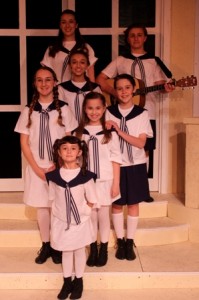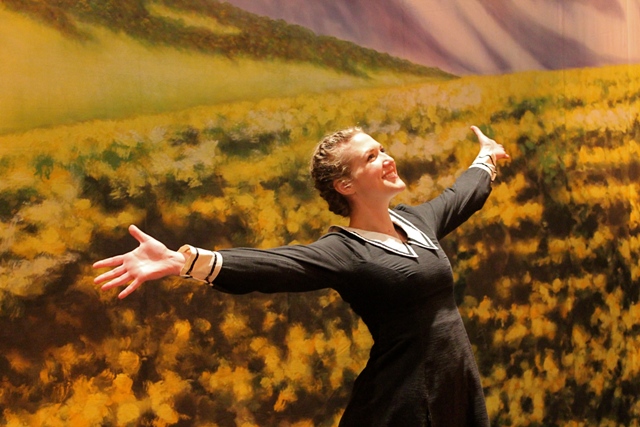
The von Trapp children in a scene from The Broadway Theatre of Pitman’s production of THE SOUND OF MUSIC.
Just ask yourself, “What is it about THE SOUND OF MUSIC that has made you a fan all these years? Was it the music? The beautiful mountain setting? The adorable children? The romance between the stern captain and the postulant, Maria? The drama of the Nazis coming to take over Austria?” Though I’d never seen the play, I knew I’d like it – love it even. Of course I had seen the film.
I doubt there are any of us who aren’t familiar with the story of Maria, Captain von Trapp and his children. The story was based on Maria’s own story and first made into a feature film. This musical, of course, takes many liberties with the original story, but not to worry; those rights were signed away before the musical was ever conceived.
In spite of some early lukewarm Broadway reviews that said the play was simplistic and the music did not do much to move the plot along, THE SOUND OF MUSIC, won The Tony for Best Musical in 1959 and was in its time the longest, and became one of the longest running plays on Broadway; it’s been produced in many countries and has been revived many times. The film made six years later would win five Oscars and pull its studio out of debt.
The Richard Rodgers and Oscar Hammerstein songs that we love, in the able hands of The Broadway Theatre of Pitman’s Musical Director William Yerkes and Conductor Christopher Adams are quite wonderful to see performed. THE SOUND OF MUSIC, however simple and jingoistic its music and lyrics are, stays with us. This production of a classic musical was entertaining, beautifully sung, full of great music and lots of love. What more could you ask?
I found Broadway Theatre of Pitman’s musical production of THE SOUND OF MUSIC as I usually find BTP’s productions: very well-done with lots of talented performers (as is possible with a stage venue this size). The productions always look good, sound good, and are musically superb as well. The costumes, which usually seem off-the-rack (nothing wrong with that) cannot be forgotten, nor can the lighting, which is exceptional. There’s always a terrific orchestra to accompany the marvelous singing voices. For the audience, the performances are always winners, especially if the chosen musicals or plays are not too classical, modern or edgy. And that seems to be the important thing.
In BTP’s production of THE SOUND OF MUSIC, all the singers were excellent, which says a lot for the musical direction of William Yerkes. I liked the character of “Maria,” energetically sung by Jamie Beth Weist, although I felt her first song, ironically, “The Sound of Music” did not have the punch it should have. I’m not sure if it was a directing or an acting moment that was lacking. There should have been a beat before she started singing and before she ended. The director (also Yerkes) needed to establish her character or the rest of the story does not make any sense. She is dreamy-eyed while on the mountain and should not move again until she hears the abbey’s bells and realizes then she needs to be back at the abbey. The night I attended, the bells rang while the music was still playing. Would it not be more dramatic for the bells to “wake” from her dream-like state? So, instead of starting on a strong “note,” (the song the musical is named after) there is a slower start and then she livens up with “My Favorite Things.” Weist had terrific energy after that, but establishing her character was made more difficult because the title song was a bit lacking.
Another favorite of mine was Nicole Corigliano who played “Elsa Schraeder” with some extra pizzazz. She wormed her way delightfully onto the stage and into the Captain’s life. She was quite good at being bad. Her character was well-established. She was consistent in her character development, which led to equally strong acting and beautiful singing; her character never waivers. The scenes she is in work better when others respond with equal disdain, if that is required of their characters. Maria, being demure at one moment, was right on; however, later, when she becomes Elsa’s competition and it should show. Maria should be letting her beautiful blond hair down sooner I think.

Captain von Trapp and his children in The Broadway Theatre of Pitman’s rendition of THE SOUND OF MUSIC.
This is where half the “class” gets upset with me. I am of the notion that theatre requires action between characters, including songs. We cheat to the front, but we rarely turn face forward and sing an entire number unless it is natural in the play to do so. That’s called a music concert, presentation or entertainment–not musical theatre. I attended a set of Broadway tunes at church recently. Loved it. Great performances. But it wasn’t theatre. (Here’s an exception. I saw ALTAR BOYZ at BTP that was performed as a concert venue; it was supposed to be.)
So, answer me this: why was the dialogue lower in volume than the song a character is singing? Confidence? Mic volume? Or, is a song perceived as more important than the “story” leading up to the song? Remember, not all the songs here are considered to move the story along.
Everyone’s acting was good overall, thought it sometimes lacked the crispness and depth of true character and scene analysis. THE SOUND OF MUSIC flew along, usually proof of the tightness of acting, but here it may have been proof of quickly moving through dialogue to get to the songs instead. With the right character motivation, and scene/script analysis–all can be achieved with the songs contributing to a strong, smart and stylishly seamless production.
Important to this show is the military and pre-war background. Missing and important to the Captain’s character and behavior is a true-to-life military bearing or presence. No one gives or receives orders at “Parade Rest;” they do it at “Attention.” And, in Germany or Austria, they would click heels and bow (or do an about face) when dismissed. I kept wondering if the Captain’s arm was pinned to his back due to an injury.
The Captain’s a great singer (though a bit soft in volume), but the contrast between his strength of character (which might have been stronger with analysis) and Maria’s, the postulant, doesn’t work at all. That bit of “slut” in Elsa’s character which we also contrast with the captain’s pride and presence should contrast as well with Maria. Max’s character may have benefited from more in-depth analysis, but he did grow on me.
The singing in this show is phenomenal–especially for community theatre. I was totally amazed by the children who were so well controlled, scurrying to their places on the set for their next set of tunes. At times however, musical direction seemed to supersede staging.
The costumes were great with a few exceptions. The Admiral needed some stripes and ribbons–anything to give him more dignity. I think Rolf might have benefited from a Hitler Youth uniform with a swastika in the early scenes, switching to the long pants later. That would help develop the tension mentioned in the early scenes.
As for the set, the bedroom was lovely, but it was only used once, while the other side was the terrace. The terrace was nicely constructed but left too much (the rest of the house) to the imagination. It might have been a good time to use flats on the sides. This one of those times when a theatre like the BTP that has resources for backdrops and curtains, that the absence of these pieces is more noticeable. Actors traveled in and out of the terrace into darkness. Possible solutions: A lighted flat? Curtain? Something to give the impression of a destination beyond the doors which we see from the audience.
Although BTP’s THE SOUND OF MUSIC is working toward the end of its run, I was very glad to review it. There is still time to see it. The Broadway Theatre of Pitman knows its audience. Bottom line: I was sitting in a filled theatre. The audience enjoyed it very much. They’ve found a place to enjoy theatre and have season tickets. They heard the songs and saw the show they loved and they were entertained. Nothing wrong with that, I guess.
THE SOUND MUSIC
Music by Richard Rodgers
Lyrics by Oscar Hammerstein II
Book by Howard Lindsay and Russell Crouse
Suggested by “The Story of the Trapp Family Singers”
Directed by William Yerkes
Musically Directed by William Yerkes
April 26 – May 19, 2013
The Broadway Theatre of Pitman
43 S. Broadway
Pitman, NJ 08071
856.384.8381
http://thebroadwaytheatre.org


